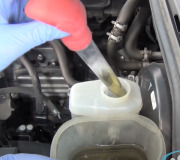Tuesday, October 27th, 2009 AT 10:23 AM
I have a 1980 Plymouth Horizon that was in storage in my garage for six years. When I drove the car again, I noticed that the brakes pulled. I raised the front end, applied the brakes and noticed that the left front brake did not work. I assumed that the caliper piston had stuck, after the car set for six years. I replaced the caliper and tried to bleed the brakes. I pumped the brakes several times, but I was unable to get any brake fluid to come out at the bleeder screw. I checked the right side, and it did bleed properly. Could there be something else wrong with the left front brake, since I am unable to get any brake fluid to come out at the bleeder screw?



